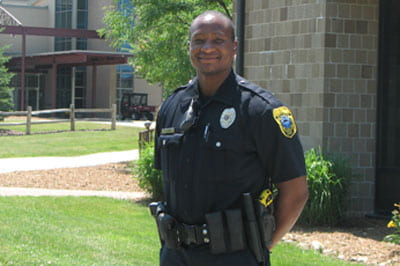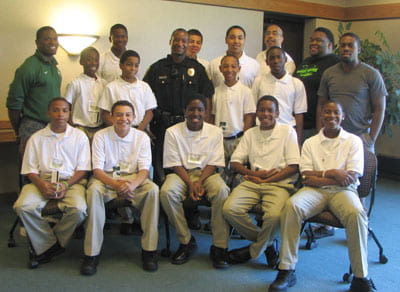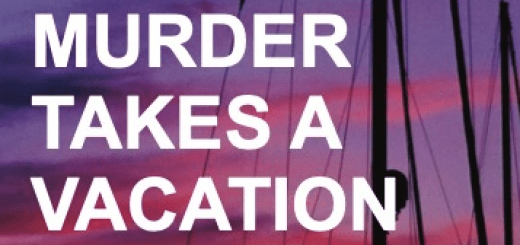Alumni Rising: Trailblazer tells students that education clears a path
 Solomon Ayres is a patrol officer for the city of Green Bay. He is also a musician, an athlete and a committed community member. Where his alma mater UW-Green Bay is concerned, he is also an important mentor.
Solomon Ayres is a patrol officer for the city of Green Bay. He is also a musician, an athlete and a committed community member. Where his alma mater UW-Green Bay is concerned, he is also an important mentor.
This summer, Ayres, along with other African American community members, spent time on campus with 12 eighth-graders from Green Bay area schools as part of the Phoenix Scholars Program. The program promotes the academic success of African American eighth-grade boys.
Ayres shared with the boys what it is like to be a patrol officer and the first African American on the police force. He shared stories about the stereotypes that come with the titles, but also the joy he feels each day because he knows he is in a position to help people. His main message was to inspire each person in the Scholars Program to use education as a means to achieve.

Phoenix Scholars and mentors, above, with Officer Solomon Ayres
Ayres graduated from UW-Green Bay in 2003. He assumed leadership roles in student activities such as the Black Student Union and in UWGB’s popular Hand Drumming Ensemble. He first thought about being a police officer while he worked as a park leader for the Green Bay Park and Recreation Department, but he set those dreams aside … for a time. Five years post-graduation, and unsettled in his professional position, he decided to rethink his career choice. A chance conversation with Green Bay Chief of Police Jim Arts had him rethinking his professional path.
“Chief Arts made me realize I was capable of much more than I was doing,” Ayres said. “I had been working for about five years in a ‘desk job’ and was open to what he had to suggest. He explained to me what it meant to be an officer. He explained to me that sense of responsibility you need to have not only for yourself, but also for your fellow officers and the rest of the community. The idea of being part of a team again was very enticing.”
A ride-along with an officer on the force sealed his decision to make a career move.
“That time with Officer Brian Jordan, and getting to see the ‘human’ side of the police made me realize they (the police) were like a huge family of brothers and sisters. I knew then that I needed to be a part of that family,” Ayres said.
It’s a decision he has never regretted.
“I like working with the community and feeling that my decisions are helping someone. But equally as fulfilling as the people in the community, are the people around me. There is always someone there ready to help you if you need it whether it is work related or not. We push each other, and challenge each other to make ourselves and the people around us better because each of us knows that we can’t do this job alone,” Ayres said.
Ayres uses his career change as an opportunity to counsel others on the value of a four-year college degree despite the fact that he did not end up in the “program of study” listed on his diploma.
“I believe that my time at UWGB gave me the ability to think critically and quickly. I had to live next to, get along with, and talk to people from many different backgrounds, religions, countries, sexual preferences, races, etc. I had a white teacher that taught me Black History, an Asian teacher that taught me Greek Philosophy, and a few black advisers that taught me about life. In retrospect, in my time at UWGB I learned that our only boundaries are those we give ourselves. Learning to understand and feel comfortable around all of these different people is a key part of being a police officer, and I’m glad to have experienced my time there. I will always miss it.”
Although he was a trailblazer in his own right — the first African American on the Green Bay police force — it is not something he gives much thought to day-to-day, he says, unless he can use the experience as a positive example to motivate others including the Phoenix Scholars.
“I look at it this way, every year since acquiring this career I have seen many people from all walks of life apply for this position and be turned away for various reasons regardless of their race,” he explains. “Law Enforcement has become a very competitive field and what most people don’t understand is that they will have to sacrifice many parts of their lives in order to reach their goal. That willingness or unwillingness to make those sacrifices can make or break your career. Therefore, I would urge people not to take the easy route and blame societal ills for the reason that it did not happen sooner, but rather to think more objectively on what each individual candidate had to offer.”




